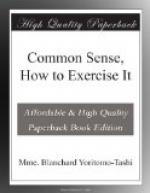Now the Shogun speaks to us with that subtlety of analysis which is characteristic and refers to a kind of sentimentality the most frequent and the least excusable.
“There are,” he tells us, “a number of people who, without knowing that they offend common sense in a most indefensible manner, invoke sentimentality in order to dispense with exercising the most vulgar pity, to the profit of their neighbor.
“A prince,” he continues, “possest a large? tract of land which he had put under grain.
“For the harvest, a large number of peasants and laborers were employed and each one lived on the products of his labor.
“But a prolonged drought threatened the crop; so the prince’s overseer dismissed most of the laborers, who failed to find employment in the parched country.
“Soon hunger threatened the inmates of the miserable dwellings, and sickness, its inseparable companion, did not fail to follow.
“Facing the conditions the prince left, and had it not been for two or three wealthy and charitable people the laborers would have starved to death.
“This pitiful condition was soon changed, abundance replaced famine, and the master returned to live in his domain.
“But amazement followed when he addrest his people as follows: Here I am, back among you, and I hope to remain here a long time; if I left you, it was because I have so great an affection for all my servants and because even the bare thought of seeing them suffer caused me unbearable sorrow.
“I am not among those who are sufficiently hard-hearted to be able to take care of sick and suffering people and to be a witness of their martyrdom. My pity is too keen to permit of my beholding this spectacle; this is why I had to leave to others, less sensitive, the burden of care which my too tender heart was unable to lavish on you.”
And that which is more terrible is that this man believed what he said.
He did not understand the monstrous rent which he made in the robe of common sense, by declaring that he had committed the vilest act of cruelty due to excessive sensitiveness since it represented a murderous act of omission.
Examples of this form of sentimentality are more numerous than we think.
There exist people who cover their dogs with caresses, gorging them with dainties, and will take good care not to succor the needy.
Others faint away at sight of an accident and never think of giving aid to the wounded.
One may observe that for people exercising sentimentality at the expense of common sense, the greatest catastrophe in intensity, if it be far away from us, diminishes, while the merest incident, a little out of the ordinary, affects them in a most immoderate manner if it be produced in the circle of their acquaintances.
It is needless to add that, if it touches them directly, it becomes an unparalleled calamity; it seems that the rest of the world must be troubled by it.




